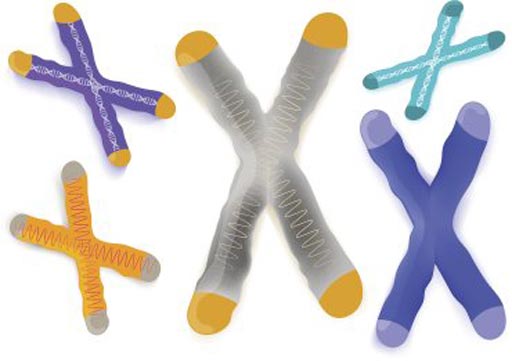Molecular Test Predicts Blood Cancer Patient Survival
By LabMedica International staff writers
Posted on 24 May 2017
Technology that can detect the length of small DNA structures in cancer cells could hold the key to predicting the outcome of patients with two different types of blood cancer. The test, used in conjunction with current methods, may help doctors make better choices about the most appropriate and effective treatment option for individual patients.Posted on 24 May 2017
Telomeres are protective stretches of DNA that cap the end of chromosomes, and act like plastic tips on shoelaces preventing chromosome ends from fraying and sticking to each other. Every time a cell divides the telomeres gradually shorten and eventually leave the chromosome ends exposed, triggering large-scale DNA damage that accelerates cancer progression and drug resistance.

Image: Technology that can detect the length of telomeres could hold the key to predicting the survival of patients with two types of blood cancer (Photo courtesy of Cardiff University).
A team of scientists led by those at Cardiff University used high-resolution single telomere length analysis (STELA) to examine the potential role of telomere dysfunction in 80 myelodysplastic syndrome (MDS) and 95 de novo acute myeloid leukemia (AML) patients. After extracting chromosomes from the patients' cancer cells, the team measured telomere length in each sample using the STELA technology they had previously developed. Telomere length was then checked against patients' medical records to analyze its impact on disease progression and survival.
The team found that while the current system was generally a good indicator of survival times, telomere length had a significant independent impact on survival. Myeloma patients who had a “good” or “standard” risk score under the current system, but had short telomeres, had the same average survival times as patients in the “high-risk” group who had long, functional telomeres. A total of 55% of patients who had long telomeres in the 'good' or 'standard' risk groups lived for over 16 years, compared to just 21% of patients in these risk groups who had short telomeres. In common with patients with myeloma, they found that differing rates of telomere erosion had a clear impact on survival. Only 7% of MDS patients with short telomeres survived for more than eight years compared with 46% of patients with long telomeres.
Duncan M Baird, PhD, a professor who led the study said, “We really need to improve the way we predict how an individual patient's myeloma or MDS will behave, as these conditions can vary widely in outcome. Our study provides strong evidence that shortening of telomeres plays a vital role in the progression of these blood cancers and that a significant number of patients should be receiving different levels of treatment.” The study was published on May 9, 2017, in the British Journal of Hematology.














